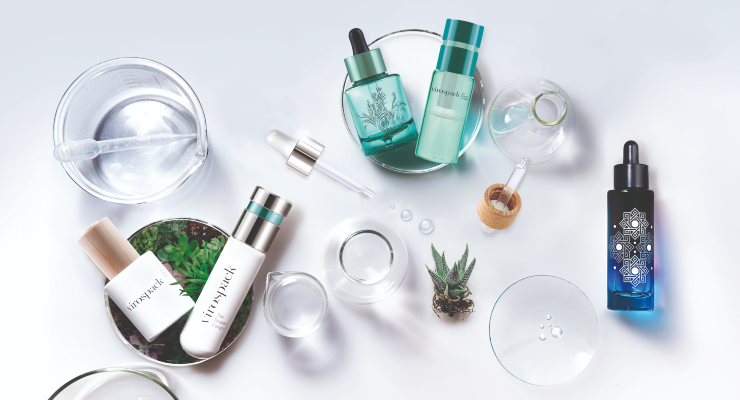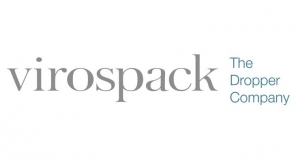Founded in 1956, Virospack has majorly advanced their production of what was once a simple black rubber dropper of high quality and functionality used on a pharma bottle, to a vast range of sophisticated droppers and bottles with striking deco effects, designed to stand out in the cosmetic market. The Barcelona-headquartered supplier prides itself on in-house production of all the components of their packs, which Jordi Salas, Technical Manager, Virospack, says gives them control over quality and timing from the start of production to the dispatch of the parts. New, advanced technology ensures production meets the highest standards available. Here, Salas tells Beauty Packaging’s Jamie Matusow about the future of innovative new dispenser packs, and machines and technologies that will ensure production success.
Jamie Matusow: Please provide some background on Virospack.
Jordi Salas: The origin of Virospack is in rubber, and the pharmaceutical industry. The continuous development and the use of new technologies led Virospack to evolve into the production of droppers for the cosmetic market. Over time, the company specialized in the manufacture and decoration of vials, and internalized all the production processes, such as the manufacture of glass pipettes and metallization.
JM: What is Virospack’s specialty and what makes your company different from competitors? What is the greatest value of Virospack?
JS: The great advantage of Virospack over the competition is the production of all the components of our packs, which gives us control over quality and timing from the start of production to the dispatch of the parts.
Our keen attention to quality and service is what makes us different. Virospack has always invested in quality, which has made our products meet the highest requirements in the cosmetic market.
Another strength which Virospack holds, is the possibility to offer different materials and technologies for the parts of the components. This makes it possible to always find a solution for dispensing the product. We offer a range of materials—Pipettes in plastic or glass, Caps in plastic compression or injection plastic, and Bulbs in plastic (TPE) or Rubber-. In addition, Virospack can develop custom components for special requirements.
JM: How has Virospack advanced in the last few years? What are the most important changes and the objective of these changes?
JS: The change is continuous. Virospack is always focusing on improving the quality and sustainability of all the production processes. Lately, we have built new facilities, dramatically increasing our production capacity, and improving the production layout. The latest investments have focused on the automation and the introduction of quality control systems with artificial vision. The glass production capacity has been boosted with the acquisition of state-of-the-art machines. New machines have incorporated the new technology of Deep Learning.
JM: I know the company focuses on innovation and sustainability. Can you please provide some details as to how these objectives are incorporated into the company´s philosophy and also into each project?
JS: We design our droppers from the beginning of the development, with sustainable materials and the most efficient manufacturing technologies, and create designs that allow the recyclability of the manufactured items.
JM: I know Virospack does a lot of development in the cosmetic market with luxury and personalization. How do innovation and sustainability, in new developments or new materials or new production techniques merge luxury and personalization?
JS: One of the strengths of Virospack is the possibility of personalizing the packs, having the ability to perform screen printing, hot stamping, pad printing, painting and also metallizing.
What makes us really stand out in this regard is Virospack’s metallization section with 3 fully automated lines, one of them with a new sputtering application system. This allows us to offer the most suitable finish according to the client's requirements.
Virospack was a pioneer in introducing water-based lacquers in its painting section, and high-solid lacquers in metallization. Currently we are working to introduce bio-based lacquers in the metallization process.
JM: Please describe a recent innovative package Virospack designed and produced. What factors made it so?
JS: Our latest development is a PCR dropper, in which all components are produced of material with a high percentage of PCR and with the benefit of being recyclable. In addition to the wide range of models available, it is possible to complement it with the option of a PCR glass bottle.
New sustainable solutions include our Wooden Dropper, which was launched last year and, to-date, the only one on the market made of 100% wood, with a single-piece wooden cap and without any plastic or glue inside. This reduced two processes—in its manufacturing and in the carbon footprint of the dropper. Recently, we have also launched our award-winning Childproof Dropper with a metal shell option for a more luxury finish.
JM: How is Virospack managing its commitment to the environment in its new developments and manufacturing processes?
JS: We can say that finally the market is committed to sustainability, and Virospack is ready to take on this challenge, betting on PCR's, water-based lacquers, biodegradable materials and more. This determined commitment to sustainability has created a Green awareness in the factory, where the 4 R’s are applied, and continuous improvement projects make industrial processes more sustainable.
JM: How do you see the company advancing its cosmetic packaging in the future?
JS: The future is to produce packs with a sustainable process. A distinguishing feature will be the use of PCRs, as well as the introduction of wood and bio-based material into the world of cosmetics. It will be essential to design packs that can be easily recycled. Another important thing is the innovation to produce a new kind of dispenser with very specific characteristics that provide new experiences in the dosage of the cosmetic droppers. Machines and technologies have to evolve in order to ensure more efficient processes.
Jamie Matusow: Please provide some background on Virospack.
Jordi Salas: The origin of Virospack is in rubber, and the pharmaceutical industry. The continuous development and the use of new technologies led Virospack to evolve into the production of droppers for the cosmetic market. Over time, the company specialized in the manufacture and decoration of vials, and internalized all the production processes, such as the manufacture of glass pipettes and metallization.
JM: What is Virospack’s specialty and what makes your company different from competitors? What is the greatest value of Virospack?
JS: The great advantage of Virospack over the competition is the production of all the components of our packs, which gives us control over quality and timing from the start of production to the dispatch of the parts.
Our keen attention to quality and service is what makes us different. Virospack has always invested in quality, which has made our products meet the highest requirements in the cosmetic market.
Another strength which Virospack holds, is the possibility to offer different materials and technologies for the parts of the components. This makes it possible to always find a solution for dispensing the product. We offer a range of materials—Pipettes in plastic or glass, Caps in plastic compression or injection plastic, and Bulbs in plastic (TPE) or Rubber-. In addition, Virospack can develop custom components for special requirements.
JM: How has Virospack advanced in the last few years? What are the most important changes and the objective of these changes?
JS: The change is continuous. Virospack is always focusing on improving the quality and sustainability of all the production processes. Lately, we have built new facilities, dramatically increasing our production capacity, and improving the production layout. The latest investments have focused on the automation and the introduction of quality control systems with artificial vision. The glass production capacity has been boosted with the acquisition of state-of-the-art machines. New machines have incorporated the new technology of Deep Learning.
JM: I know the company focuses on innovation and sustainability. Can you please provide some details as to how these objectives are incorporated into the company´s philosophy and also into each project?
JS: We design our droppers from the beginning of the development, with sustainable materials and the most efficient manufacturing technologies, and create designs that allow the recyclability of the manufactured items.
JM: I know Virospack does a lot of development in the cosmetic market with luxury and personalization. How do innovation and sustainability, in new developments or new materials or new production techniques merge luxury and personalization?
JS: One of the strengths of Virospack is the possibility of personalizing the packs, having the ability to perform screen printing, hot stamping, pad printing, painting and also metallizing.
What makes us really stand out in this regard is Virospack’s metallization section with 3 fully automated lines, one of them with a new sputtering application system. This allows us to offer the most suitable finish according to the client's requirements.
Virospack was a pioneer in introducing water-based lacquers in its painting section, and high-solid lacquers in metallization. Currently we are working to introduce bio-based lacquers in the metallization process.
JM: Please describe a recent innovative package Virospack designed and produced. What factors made it so?
JS: Our latest development is a PCR dropper, in which all components are produced of material with a high percentage of PCR and with the benefit of being recyclable. In addition to the wide range of models available, it is possible to complement it with the option of a PCR glass bottle.
New sustainable solutions include our Wooden Dropper, which was launched last year and, to-date, the only one on the market made of 100% wood, with a single-piece wooden cap and without any plastic or glue inside. This reduced two processes—in its manufacturing and in the carbon footprint of the dropper. Recently, we have also launched our award-winning Childproof Dropper with a metal shell option for a more luxury finish.
JM: How is Virospack managing its commitment to the environment in its new developments and manufacturing processes?
JS: We can say that finally the market is committed to sustainability, and Virospack is ready to take on this challenge, betting on PCR's, water-based lacquers, biodegradable materials and more. This determined commitment to sustainability has created a Green awareness in the factory, where the 4 R’s are applied, and continuous improvement projects make industrial processes more sustainable.
JM: How do you see the company advancing its cosmetic packaging in the future?
JS: The future is to produce packs with a sustainable process. A distinguishing feature will be the use of PCRs, as well as the introduction of wood and bio-based material into the world of cosmetics. It will be essential to design packs that can be easily recycled. Another important thing is the innovation to produce a new kind of dispenser with very specific characteristics that provide new experiences in the dosage of the cosmetic droppers. Machines and technologies have to evolve in order to ensure more efficient processes.















